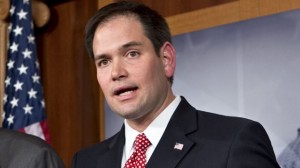

Fortunately, we can also hear voices calling for the United States to strengthen its role in the world. In an address to the American Enterprise Institute, Senator Marco Rubio (R-FL) argued that, “A globally engaged America comes at a steep price… But the history of our young nation is full of warnings that a lack of American engagement comes with an even higher price of its own.” In addition, Senator Rubio emphasized that U.S. civilian engagement could prevent conflict, stating that, “the decisive use of diplomacy, foreign assistance, and economic power are the most effective ways to achieve our interests and stop problems before they spiral into crises.”
The day before at a Senate Foreign Relations Committee hearing, Senator Rubio noted that the U.S. relief efforts following Super Typhoon Haiyan were “a graphic example of imagining a world without an engaged United States and this response effort would not be at the stage it’s at right now. It’s not just the right thing to do, but it calls attention to the how important it is that we remain engaged in this region, but also around the world.”
Senator Rubio has joined Senator Benjamin Cardin (D-MD), Rep. Ted Poe (R-TX), and Rep. Gerry Connolly (D-VA) to co-sponsor bi-partisan legislation to ensure that U.S. assistance programs are effective in order to achieve the best return on investment for the American taxpayer. Both the Senate Foreign Relations Committee and the House Foreign Affairs Committee have their respective bills to strengthen the effectiveness and accountability of foreign assistance programs, with the Senate passing the Foreign Aid Transparency and Accountability Act through committee last week. With the threat of further budget cuts, this legislation is working to ensure that foreign assistance programs get the most bang for our buck.
Brookings Scholar Robert Kagan also recently asked about global leadership, “if not the United States, then who?” Senator Rubio echoed that sentiment as well, posing the question, “If America stops leading, who will fill the vacuum we leave behind?” History has shown that when the United States answers the call of helping citizens of the world, a lot of good can happen. Just look at the Marshall Plan. And as we continue to see in the Philippines, the world is a better place when we bring our compassion and generosity to help those in need.